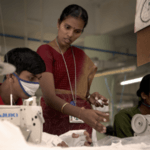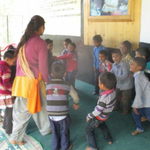This year’s International Women’s Day comes at an unprecedented moment for global attention and engagement on the realities of women around the world. As SSIR’s Managing Editor Eric Nee wrote in our Spring 2018 issue, this past year has truly been the Year of the Woman.
Whether you’re a policymaker, a community organizer, donor, business leader, or staffer at a local nonprofit, we invite you to reflect on how your work advances women’s rights and gender equality. We’ve rounded up some of our articles on issues such as economic empowerment, education, social norms, and movement building.

1. The Next Sustainability Frontier: Gender Equity as a Business Imperative: While uprooting gender inequities across the corporate value chain is considered both good for society and good for business, most companies remain on the sidelines. They have, however, increasingly sought to analyze their environmental impacts. Katherine Fritz and Genevieve Smith of the International Center for Research on Women’s advisory practice, and Marissa Wesely, CEO of the nonprofit Win-Win Strategies, argue that advancing women’s opportunity and empowerment is equally material to corporate competitiveness and sustainability. The authors look at how gender issues impact corporate risk, productivity, and growth, and offer steps for integrating gender into core business operations.

2. Ten Trends in Girls’ Education: To achieve the Sustainable Development Goals related to inclusive education and gender equality, organizations working in those areas must examine how girls’ education has changed over the past few years. Based on a survey of 125 organizations, Christina Kwauk and Amanda Braga of the Center for Universal Education at the Brookings Institution, and Nora Fyles, Head of the Secretariat for the United Nations Girls’ Education Initiative, offer 10 strategic trends that demonstrate how the field is grappling with a new era in girls’ education, and suggest both potential gaps in the effort and opportunities for action.

3. Can #MeToo Have Lasting Influence?: To ensure that the #MeToo movement does not lose momentum, advocates and organizers need to think strategically about how to ensure that women are supported as they continue to report sexual violence and hold perpetrators accountable. To do so, Annie Neiman, a doctoral candidate at the University of Florida, suggests they look to the science on social norms—the shared beliefs of how people behave or should behave.

4. Understanding “Equal Pay” and How to Achieve It: Companies and shareholders are increasingly seeing pay equity as a strategic business imperative. But what does “equal pay” really mean? And how do we know when it’s been achieved? Genevieve Smith and Kellie McElhaney, an adjunct professor at the Haas School of Business at the University of California Berkeley, examine three common ways the pay gap is measured, what leading companies are doing about it, and the best strategies to consider today to truly bridge the gap.

5. A New Approach to Gender-Lens Grantmaking: How can philanthropists and for-profit investors accelerate progress toward gender equality? More funding for efforts to reexamine and transform the underlying norms and beliefs that disempower females is critical, write Imago Dei Fund President Emily Nielsen Jones, Global Fund for Women CEO Musimbi Kanyoro, and Dasra co-founder Neera Nundy. They offer advice for grantmakers and, through examples, make the case that India provides particularly fertile ground for the gender-lens movement. Read more from our Impact India series.

6. Holding Up the Sky: Achieving Women’s Empowerment Requires Working with Women and Men: There is mounting evidence that directing development projects toward women while neglecting men may actually be hurting the cause of women’s economic inclusion. When men do not have access to the same resources as women do or feel that they are losing their power relative to women, they are more likely to undermine projects. As part of their gender and the economy series, postdoctoral fellow Rachael Goodman and Sarah Kaplan, director of the Institute for Gender and the Economy, look at how involving men can lead to greater impact for women and changes to gender norms.
댓글 없음:
댓글 쓰기